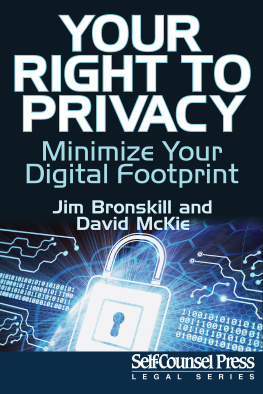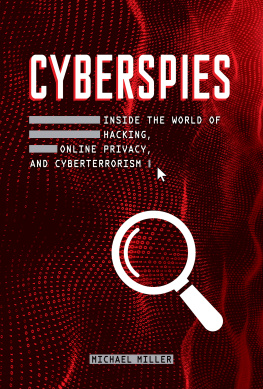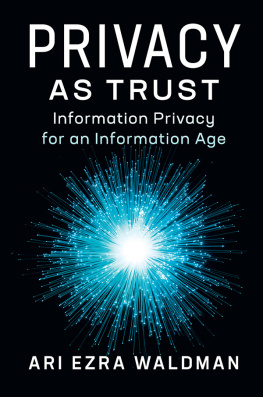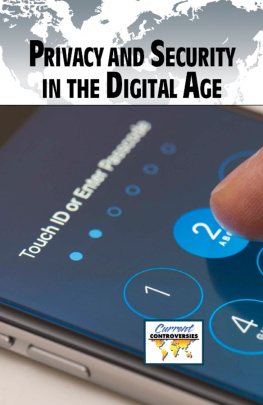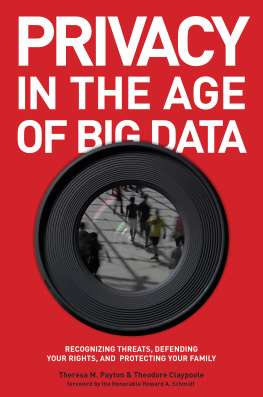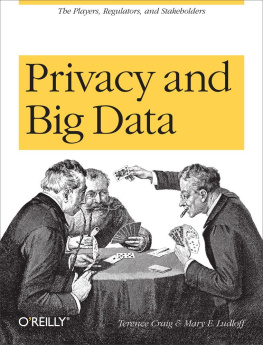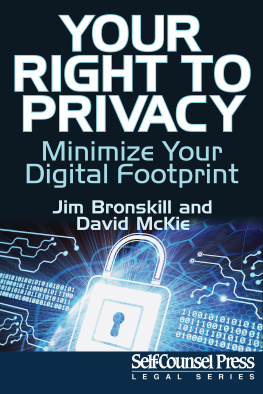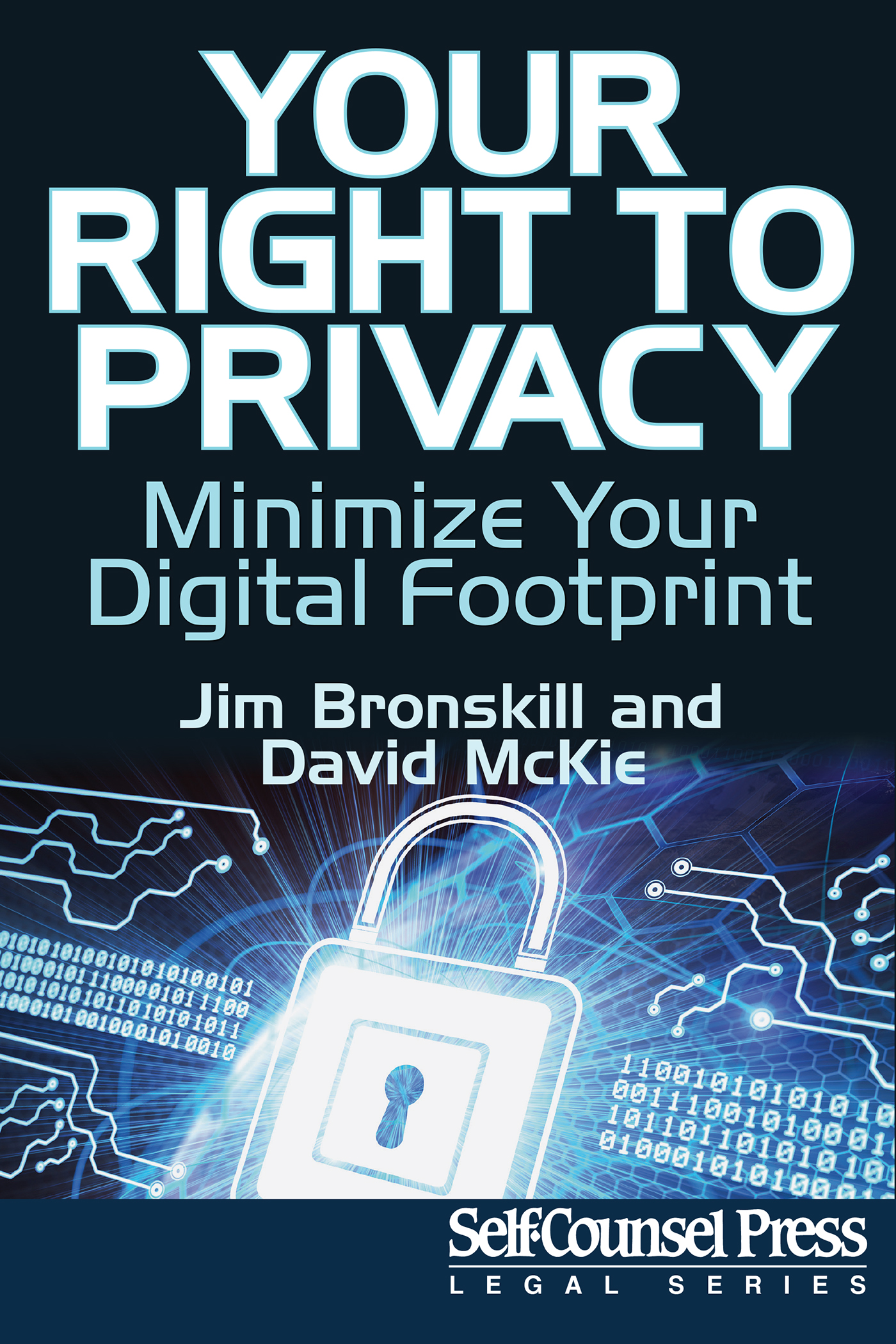Foreword
The amount of online data is increasing at an alarming rate. Many of our traditional face-to-face interactions such as banking, shopping, and social connections are now taking place online. While more knowledge may lead to undeniable economic and social benefits, the availability of data and specialized analytics that are capable of linking seemingly anonymous information can paint an accurate picture of our private lives. This raises significant concerns about the future of privacy. Preserving privacy may depend on our ability to reclaim control of our online information and personal identities, ensuring continued freedom and liberty via privacy and data protection, in the midst of 21st-century technologies.
We are social animals who seek contact with each other, but we also seek privacy: moments of solitude, intimacy, quiet, reserve, and control personal control. These interests have coexisted for centuries and must continue to do so, for the human condition requires both. To achieve these competing objectives, organizations must embed easily accessible, privacy-protective controls into their services, or what I call, Privacy by Design. Equally important, though, must be the willingness of each of us to use them. So while much work is required on the part of organizations to gain our trust that they will be upstanding data custodians, as individuals who also independently contribute to our online identities, we too must shoulder some responsibility for our online privacy.
Your Right to Privacy: Minimize Your Digital Footprint makes a valuable contribution to simplifying the complex online ecosystem into manageable chunks so that each of us is able to understand the implications of our online activities for our privacy. This practical user guide is an encyclopedia of knowledge about privacy and even more, including advice and tips about how we can protect our online identities without needing an advanced degree in science, technology, engineering, or mathematics.
We can, and must, have both the future of privacy the future of freedom, may well depend on it. As the saying goes if you ask for it, it will come. So speak up, get smart, and claim your privacy!
Dr. Ann Cavoukian,
Executive Director of the Privacy and Big Data
Institute at Ryerson University and former Information and Privacy Commissioner of Ontario
(ryerson.ca/pbdi/about/people/cavoukian.html)
Introduction
I never said, I want to be alone. I only said, I want to be let alone! There is all the difference.
Greta Garbo
Digital technology has profoundly changed the way we learn, work, communicate, play, and enjoy culture. It has become such a ubiquitous part of our lives and brings so many tangible benefits that we might overlook the not-so-obvious costs.
Perhaps chief among those costs is the surrender of our privacy, threads of personal information from the fabric of our online existence. Sometimes we unknowingly give up the cloak of anonymity through the click of a mouse. But increasingly we are witting participants in handing over personal details as we navigate the online world.
Sharing photos, messages, and our likes and dislikes through social media is fun not to mention free and the fact a site such as Facebook harvests our information for commercial purposes in the process just seems part of the bargain. Googling has become a verb, and is now second nature, so we accept the targeted advertising that pops up as a result of our searches.
University of Victoria Political Science Professor Colin Bennett, one of the experts whose opinions we canvassed, put it succinctly: Our lives are becoming more transparent to multiple organizations.
This book will make you more aware of these transactions, help you better understand them, and show you practical ways to minimize your digital footprint. It is organized around the activities of daily life at home, at work, in transit, crossing the border and, of course, online.
By the time you read this, there will no doubt be both new ways of interacting with the world that put your privacy at risk and fresh solutions for protecting your personal information. Privacy in the modern age is a fast-moving target, but we hope this guide hits the immediate mark and gives you a sense of where its all going.
Privacy Principles
The right to privacy has been neatly summarized as the right to be left alone. For our purposes, we will broaden that notion to embrace principles embodied in Canadas federal privacy regime:
Information should be collected, used, and shared only for specific purposes.
Data should be stored and disposed of responsibly.
People should have a right to see information gathered about them.
Upon being made aware of errors in a personal file, the holder should correct the information.
People should have the right to complain if personal data is being used for unintended purposes.
In examining an array of issues from crossing the border to the scourge of identity theft we will look at how these basic principles apply. Wherever possible, the book will also emphasize what you can do to avoid, address, and remedy potential difficulties each privacy risk might present.
Chapter 1
Privacy Through the Ages
In the 11th century, defending England from possible invasion by Scandinavia meant having the funds to maintain a robust army. So in 1086, William the Conqueror undertook an ambitious survey of taxpayers across the land.
One observer noted, There was no single hide nor a yard of land, nor indeed one ox nor one cow nor one pig which was left out. The epic scale of the endeavor would see it compared to the biblical Judgment Day, or Doomsday, resulting in a sheepskin text composed in black and red ink known as the Domesday Book.
It seems governments of various stripes have attempted through history to monitor citizens as a means of enriching the treasury or detecting signs of dissent.
The methods of state control exercised by totalitarian regimes are depressingly familiar: Widespread use of informants, pervasive electronic surveillance, a lack of due process, and arbitrary detention.
In his seminal 1984, George Orwell describes a rigidly controlled society under the ever-watchful eye of Big Brother one in which omnipresent telescreens monitor citizens and the Thought Police investigate suspected disloyalty. The novel, published in 1949, seemed to anticipate the surveillance states of the Communist Bloc typified by the East German Stasi, which turned neighbor against neighbor in cultivating a vast web of informants.
Though western nations avoided excesses on this scale, the intelligence services of Britain, Canada, and the United States spied on a wide array of citizens who dared question the Cold War political orthodoxy, amassing many thousands of files.
International agreements including the European Convention on Human Rights and the International Covenant on Civil and Political Rights of the United Nations began to entrench privacy guarantees. At last count, at least 99 countries have enacted privacy laws.

